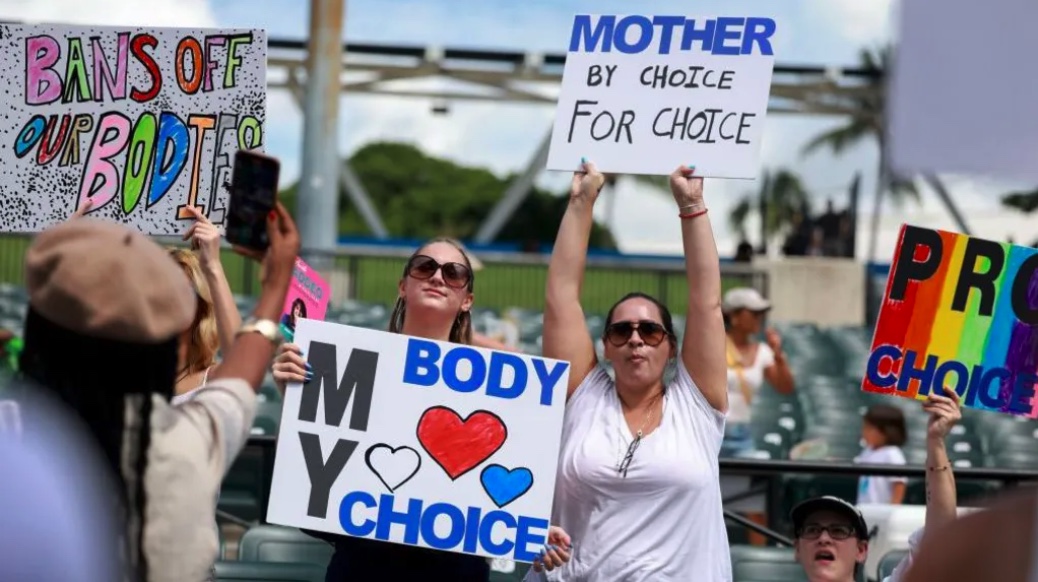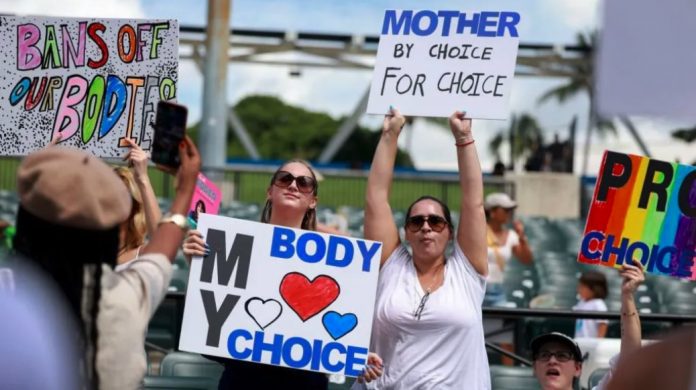ในวันอังคารนี้ เบตซี่ ลิงค์ฮอร์สท์ วัย 18 ปี จะลงคะแนนเสียงครั้งแรกไม่เพียงแต่เพื่อเลือกผู้ที่จะเข้ารับตำแหน่งในทำเนียบขาว แต่ยังเกี่ยวกับปัญหาการทำแท้งด้วย รัฐฟลอริดาของเธอเป็นหนึ่งใน 10 รัฐทั่วประเทศที่มีปัญหาการทำแท้งอยู่ในบัตรเลือกตั้งในปีนี้
หากมาตรการในฟลอริดา ซึ่งคือการแก้ไขเพิ่มเติมที่ 4 ได้รับการอนุมัติ จะเป็นการยกเลิกกฎหมายห้ามทำแท้งในช่วงหกสัปดาห์ที่มีผลบังคับใช้ในขณะนี้ และขยายการเข้าถึงจนถึงจุดที่ทารกมีความสามารถในการมีชีวิตอยู่ ซึ่งประมาณ 24 สัปดาห์ของการตั้งครรภ์ นอกจากนี้ยังอาจจะทำได้ในกรณีที่ “จำเป็นเพื่อปกป้องสุขภาพของผู้ป่วย” ตามที่ระบุในเนื้อหาของมาตรการ
คุณลิงค์ฮอร์สท์ ซึ่งกล่าวว่าเธอรู้สึก “กังวล” เกี่ยวกับการใช้ชีวิตในรัฐที่มีการเข้าถึงการทำแท้งที่จำกัด บอกกับ BBC ว่าเธอจะลงคะแนนเสียงให้ “ใช่”
“เราจำเป็นต้องลงคะแนนเสียงตามสิทธิของเรา” เธอกล่าวเกี่ยวกับการลงคะแนนเสียงทั้งเพื่อคามาลา แฮร์ริส และการขยายการเข้าถึงการทำแท้งในฟลอริดา “ฉันไม่คิดว่ารัฐบาลมีสิทธิ์ในการควบคุมร่างกายของผู้หญิง”
ในบรรดามาตรการการทำแท้งที่อยู่ในบัตรเลือกตั้งในสัปดาห์นี้ คำถามในบัตรเลือกตั้งของฟลอริดาจะได้รับการจับตามองมากที่สุด รัฐนี้เคยเป็นหนึ่งในสถานที่สุดท้ายที่ผู้หญิงในภาคใต้ของประเทศสามารถทำแท้งได้ตามกฎหมายสูงสุดถึง 15 สัปดาห์ แต่ในเดือนพฤษภาคม ฟลอริดาได้บังคับใช้กฎหมายที่เข้มงวดมากขึ้นซึ่งห้ามทำแท้งหลังจากหกสัปดาห์ โดยมีข้อยกเว้นน้อยมาก ซึ่งเป็นช่วงเวลาที่ผู้หญิงส่วนใหญ่ยังไม่รู้ว่าตนเองตั้งครรภ์
การสำรวจความคิดเห็นบ่งชี้ว่าผู้มีสิทธิเลือกตั้งในฟลอริดาส่วนใหญ่สนับสนุนการแก้ไขเพิ่มเติมที่ 4 แต่ต้องถึงเกณฑ์ 60% ถึงจะผ่านได้ และการสำรวจบอกว่าถึงแม้จะมีการสนับสนุนอย่างเข้มแข็ง แต่แคมเปญอาจไม่สามารถถึงเกณฑ์ดังกล่าวได้ในรัฐที่มีแนวโน้มอนุรักษ์นิยมนี้
หากมาตรการดังกล่าวผ่าน จะถือเป็นชัยชนะครั้งใหญ่สำหรับขบวนการสิทธิสตรีในการทำแท้ง “นี่คือสถานที่ที่ยากที่สุดในประเทศในการชนะ” เคลลี่ ฮอลล์ นักยุทธศาสตร์ที่ทำงานเกี่ยวกับมาตรการสิทธิการทำแท้งกล่าว และเป็นผู้อำนวยการโครงการแฟร์เนส “ถ้าเราผ่านอุปสรรคนี้ไปได้ จะไม่มีอะไรหยุดเราไม่ให้ผ่านมาตรการในทุกที่ที่มันถูกกฎหมาย”
นี่เป็นการเลือกตั้งระดับชาติครั้งแรกนับตั้งแต่ศาลสูงสุดของสหรัฐฯ ได้ยกเลิกคำพิพากษาคำตัดสิน Roe v. Wade ซึ่งให้สิทธิแก่รัฐในการควบคุมการทำแท้งด้วยตนเอง ตั้งแต่นั้นมา 17 รัฐได้ออกกฎหมายห้ามการทำแท้งที่จำกัดการทำแท้งเกือบทั้งหมดภายในเขตแดนของตน
ในช่วงกลางปี 2022 ซึ่งจัดขึ้นไม่กี่เดือนหลังจากคำตัดสินของศาลสูงสุด ผู้มีสิทธิเลือกตั้งในรัฐที่มีแนวโน้มอนุรักษ์นิยมอย่างเคนตักกี้และแคนซัสได้ลงคะแนนเสียงต่อต้านการจำกัดการทำแท้ง ส่งผลให้เห็นว่าการเข้าถึงการทำแท้งเป็นที่สนับสนุนอย่างกว้างขวางจากประชาชนชาวอเมริกัน
ในขณะนี้ พรรคเดโมแครตหวังว่า มาตรการการทำแท้งในรัฐสำคัญอย่างอริโซนาและเนวาดาจะกระตุ้นให้ผู้มีสิทธิเลือกตั้งมาที่หน่วยเลือกตั้งเพื่อลงคะแนนเสียงสนับสนุนสิทธิการทำแท้ง และในขณะเดียวกัน จะผลักดันให้รองประธานาธิบดีแฮร์ริสเข้าสู่ทำเนียบขาวและผู้สมัครของพรรคอื่น ๆ ประสบความสำเร็จ
ในสัญญาณที่บ่งบอกถึงความสำคัญของปัญหาการทำแท้งต่อผู้มีสิทธิเลือกตั้ง ผู้สมัครชิงตำแหน่งประธานาธิบดีจากพรรครีพับลิกัน โดนัลด์ ทรัมป์ ซึ่งอาศัยอยู่ในฟลอริดา ได้พยายามถอยห่างจากจุดยืนที่เคยเข้มงวดต่อการทำแท้ง ตอนนี้เขากล่าวว่า เขาคิดว่าควรปล่อยให้แต่ละรัฐและผู้มีสิทธิเลือกตั้งตัดสินใจว่าการทำแท้งควรจะถูกควบคุมอย่างไร
เมื่อเดือนสิงหาคมที่ผ่านมา ในการสัมภาษณ์กับ NBC เขาดูเหมือนจะบ่งบอกว่าเขาจะลงคะแนนเสียงสนับสนุนการแก้ไขเพิ่มเติมที่ 4 แต่หลังจากการประท้วงจากผู้สนับสนุนที่ต่อต้านการทำแท้ง เขากล่าวว่าเขาจะลงคะแนนเสียงคัดค้าน
ประเด็นนี้มีการแบ่งแยกในรัฐที่มีแนวโน้มอนุรักษ์นิยมเช่นฟลอริดา
แนนซี คอลลินส์ วัย 88 ปี ลงคะแนนเสียงไม่เห็นด้วยกับการแก้ไขเพิ่มเติมที่ 4 เนื่องจากความเชื่อทางศาสนาของเธอ
“ฉันเคยต่อต้านการทำแท้งเสมอ” เธอกล่าว “มันขัดกับศาสนาของฉัน”
คุณคอลลินส์สนับสนุนตำแหน่งปัจจุบันของทรัมป์ที่ว่า นโยบายการทำแท้งควรจะปล่อยให้รัฐแต่ละรัฐตัดสินใจ และเธอหวังว่าฟลอริดาจะปฏิเสธการขยายขอบเขตเกินกว่ากฎหมายห้ามทำแท้งในปัจจุบันที่หกสัปดาห์
ผู้ว่าการรัฐฟลอริดา รอน เดซานติส ก็ได้ใช้พลังของรัฐบาลของรัฐในการต่อต้านมาตรการดังกล่าว เขากล่าวว่ามาตรการนี้จะอนุญาตให้เด็กทำแท้งได้โดยไม่ต้องได้รับความยินยอมจากผู้ปกครอง ซึ่งผู้สนับสนุนการแก้ไขเพิ่มเติมที่ 4 ได้ปฏิเสธข้อกล่าวหานี้
เมื่อเดือนที่แล้ว เขาประกาศว่าการแก้ไขนี้จะทำให้ “ฟลอริดาเป็นเขตที่มีการทำแท้งที่รุนแรงที่สุดไม่เพียงแต่ในสหรัฐอเมริกา แต่ในทุกที่ในโลก”
กระทรวงสาธารณสุขของรัฐยังได้เปิดเว็บไซต์เพื่อต่อต้านการแก้ไขที่ 4 และในเดือนตุลาคม ผู้พิพากษาได้ยกเลิกความพยายามของกระทรวงสาธารณสุขในการบล็อกสถานีโทรทัศน์จากการออกอากาศโฆษณาสนับสนุนการแก้ไขเพิ่มเติมที่ 4
มาตรการการทำแท้งไม่ได้รับประกันว่าจะช่วยสนับสนุนแฮร์ริส หรือการเมืองของพรรคเดโมแครตอื่น ๆ ให้มีความก้าวหน้าในปีนี้ในการแข่งขันที่ถกเถียงกัน
ในฟลอริดาซึ่งทรัมป์ชนะอย่างสบายในปี 2016 และ 2020 เขาคาดว่าจะชนะอีกครั้งอย่างกว้างขวาง
การสำรวจความคิดเห็นของ New York Times/Siena College ชี้ให้เห็นว่า 12% ของผู้มีสิทธิเลือกตั้งในอริโซนาและฟลอริดาจะลงคะแนนเสียงให้กับทรัมป์พร้อมกับมาตรการสิทธิสตรีในการทำแท้ง
โจเนล โจนส์ วัย 37 ปี เป็นอดีตสมาชิกพรรคเดโมแครตที่ตัดสินใจลงคะแนนเสียงให้ทรัมป์ในปีนี้ เธอเคยมองหางานอยู่หลายเดือน และรู้สึกว่าประธานาธิบดีคนก่อนมีความสามารถในการจัดการเศรษฐกิจที่ดีกว่าและอาจจะปรับปรุงโอกาส
All eyes are on Florida’s abortion amendment

On Tuesday, Betsy Linkhorst, 18, will cast her very first vote not just for who should be in the White House, but on the issue of abortion.
Her home state of Florida is one of 10 across the country that will have abortion on the ballot this election.
If passed, Florida’s measure – Amendment 4 – would overturn the six-week abortion ban currently in effect here and expand access to the point of foetal viability, which is about 24 weeks of pregnancy. It could also be later “when necessary to protect the patient’s health”, according to the measure’s wording.
Ms Linkhorst, who said she was “nervous” about living in a state with limited abortion access, told the BBC she was going to vote yes.
“It’s important to vote based on our rights,” she said of her vote both for Kamala Harris and for expanding abortion access in Florida. “I don’t think it’s the government’s right to police women’s bodies.”
Of all the abortion measures on the ballot this week, Florida’s ballot question will be the most closely watched.
The state was, for over a year, one of the last places that women in the southern part of the country could get a legal abortion, up to 15 weeks. But in May, Florida enacted an even more restrictive law, which banned abortions after six weeks – with few exceptions – which is before most women know they are pregnant.
Polls suggest a majority of Florida voters are backing Amendment 4. But the amendment must reach a 60% threshold to pass – and surveys are indicating that while it has strong support, the campaign might not quite meet that bar in the fairly conservative state.
If it did pass, that would be viewed as a huge victory for the abortion-rights movement.
“It’s the hardest place in the country to win,” said Kelly Hall, a strategist who works on abortion rights ballot measures and executive director of the Fairness Project. “If we overcome that particular barrier, there’s absolutely nothing holding us back from passing ballot measures everywhere it’s legal.”
This is the first national election held since the US Supreme Court overturned Roe v Wade, giving states the right to regulate abortion themselves. Since then, 17 states have enacted bans that restrict nearly all abortions within their borders.
During the 2022 midterms, held months after the top court’s decision, voters in conservative states Kentucky and Kansas voted against restricting abortion, sending a message that access to the procedure is broadly supported by the American people. The issue is also credited with helping the Democrats do better than expected in congressional races.
Now, Democrats hope again that abortion measures in key battleground states like Arizona and Nevada will drive their voters to the polls to back abortion rights – and while they’re at it, propel Vice-President Harris to the White House and their down-ballot candidates to victory.
In a sign of how salient the issue of abortion has been for voters, Republican White House nominee Donald Trump, a resident of Florida, has tried to back away from his once-hardline stance against abortion. Now, he says he thinks the decision on how it should be regulated ought to be left up to states, and voters.
Last August in an interview with NBC, he seemed to indicate he would vote in favour of Amendment 4. But after outcry from his anti-abortion supporters, he said he would vote against it.
The issue is divisive in the Republican-leaning state.
Nancy Collins, 88, had voted no on Amendment 4 due to her Catholic faith.
“I’ve always been anti-abortion,” she said. “It’s against my religion.”
Ms Collins supported Trump’s current position that abortion policy should be left to individual states, and she hoped Florida would reject any expansion beyond its current six-week ban.
Florida’s Governor Ron DeSantis has also marshalled the powers of his state government to beat back the measure.
He says the measure would allow children to get abortions without parental consent, a claim that Amendment 4’s backers reject.
Last month he declared the amendment would make “make Florida one of the most radical abortion jurisdictions not just in the United States but anywhere in the world”.
The state’s health department also launched a website opposing Amendment 4. And in October, a judge overturned the health department’s attempts to block a television station from airing an ad in support of Amendment 4.
Abortion measures are not guaranteed to deliver Harris, or other Democratic politicians, the boost they hope to see this year in contested races.
In Florida, which Trump won handily in 2016 and 2020, he is widely expected to win another victory.
A New York Times/Siena College poll suggested that 12% of voters in Arizona and Florida would vote for Trump as well as an abortion rights measure.
Jonel Jones, 37, is a former Democrat who decided to vote for Trump this year. She had been looking for a job for months, and felt the former president had a stronger handle on the economy and could potentially improve her prospects.
She personally did not believe in abortion, she said. But she had read stories from other states like Georgia and Texas about pregnant women who became sick or died after being denied abortion or miscarriage treatment, and did not want a similar situation in Florida.
“I don’t think it’s right,” Ms Jones said.
After ticking the box for Donald Trump, she voted “yes” on Amendment 4.
By Kayla Epstein, BBC News

















